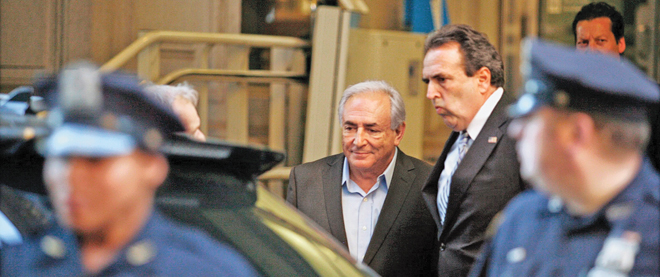Strauss-Kahn’s defence is a ‘PI firm on steroids’
DSK has hired the best snoops in the business
David Karp/AP
Share

Even now, so the rumour goes, detectives with Guidepost Solutions LLC, the global investigations firm that’s reportedly been hired by Dominique Strauss-Kahn’s defence team, are in Guinea probing the background of the 32-year-old hotel maid whose allegations last month led New York police to lay charges of attempted rape against the former IMF chief. Guidepost, which enjoys international reach from its Madison Avenue address, is who you hire if, like Strauss-Kahn, you’re married to the multi-millionaire Anne Sinclair—an agency said to charge in the range of $700 an hour per investigator.
This isn’t your traditional film noir gumshoe. Guidepost’s principals include past federal prosecutors, a former chief of IBM security, and a one-time special agent with the U.S. secret service—“a cross between a PI firm on steroids and an accounting-slash-forensics firm,” says Michel Juneau-Katsuya, a former senior intelligence officer with the Canadian Security Intelligence Service. “People who are capable of reaching out to international resources and counting on a network of investigators and sources.”
The firm’s clients are just as rarified. One is Ken Feinberg, the co-called “pay czar” appointed by Barack Obama to administer compensation claims made in the aftermath of the BP oil spill; the Gulf Coast Claims Facility, the agency established to divvy up BP’s $20-billion fund and which Feinberg heads, has tapped the firm to investigate thousands of fraudulent claims, a dizzyingly amorphous file. Guidepost investigators reportedly uncovered one fraud last year when they compared photo ID of a claimant they knew to be dead with a photo of her living sister, finding them “very similar.” That probe led authorities to charge the woman with making a bid for BP cash by posing as her deceased sibling.
The firm is one of a host of high-end agencies said to have been retained by Strauss-Kahn to help burnish his increasingly rusty, faltering star. They include criminal lawyer Benjamin Brafman, who once represented Michael Jackson, and TD International, an investigations and PR outfit run by ex-diplomats and CIA operatives that at one time worked for Yulia Tymoshenko, the beguiling golden-haired leader of Ukraine’s “Orange Revolution.” Yet none of Strauss-Kahn’s hires better illustrates the extent of his troubles, or his capacity for optimism, than Guidepost.
Its leadership is well acquainted with men of power, either as clients, employers or, at the opposite end of the microscope, as so-called “subjects”—the detectives’ quarry. Bart Schwartz, the firm’s chairman, oversaw criminal prosecutions under Rudolph Giuliani when Giuliani was a crusading New York U.S. attorney with testosterone enough to tackle both Wall Street malfeasance and the Mob. Joe Rosetti, the former worldwide head of security for IBM and Guidepost’s vice-chair, helped track Saddam Hussein’s stealth money reserves after the Kuwaiti government hired Rosetti’s former firm, Kroll, the granddaddy of high-end investigations outfits that’s sometimes called the “CIA of Wall Street.”
Indeed, both Rosetti and Schwartz cut their teeth as sleuths-for-hire at Kroll, founded by Jules Kroll and often credited with rescuing the profession from seedy divorce probes and shutterbugging cheating spouses. Rather than just ex-cops, “Kroll hired former prosecutors or federal law enforcement—FBI, DEA, the secret service,” says Sandy Boucher, a Toronto-based private-sector fraud investigator at Grant Thornton LLP and a former Kroll employee. Kroll Inc. and the agencies it helped spawn beguiled corporate clients with new tacks on risk mitigation, crisis management, competitor analysis and due diligence. As Rosetti told the New Yorker in 2009, Kroll “was legitimatizing private-detective work at a different level.” Guidepost may now pick up the mantle after Kroll himself sold his firm and moved on: “It looks to me like they are on their way to maybe even supplant Kroll if they do well,” says Boucher.
But if firms like Guidepost became successful emulating Kroll’s dry accounting and corporate intelligence, the Strauss-Kahn job puts investigators back into the sleazy end of the game. “They’re going to investigate the thing to death,” Boucher says. “They’ll cover every bloody angle they can to see if they can find enough weaknesses from a defence counsel’s way of looking at things.” That means details that would derail the prosecution’s case against Strauss-Kahn by either damaging the complainant’s credibility—hence that rumoured trip to Guinea—or damning the physical evidence those prosecutors will need to marshall against him.
Perhaps Strauss-Kahn’s team already has what it needs. In a letter sent to the DA last week, his lawyers claimed they held “substantial information that in our view would seriously undermine the quality of this prosecution and also gravely undermine the credibility of the complainant.” Such information, if it exists, will have certainly come at a cost; lucky for Strauss-Kahn, he can afford it.